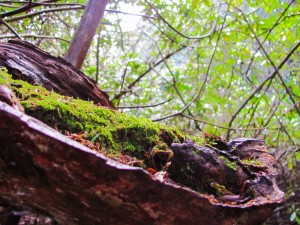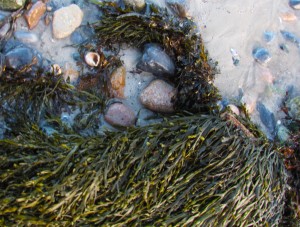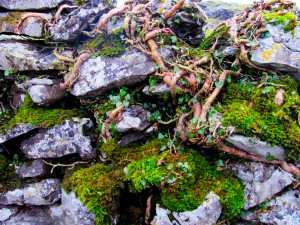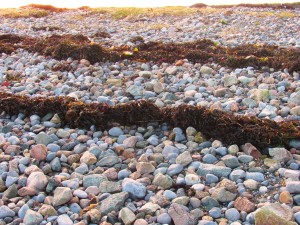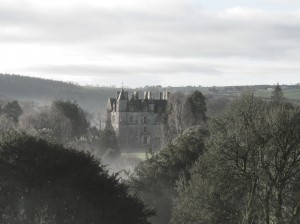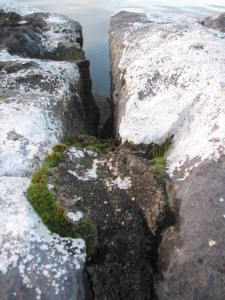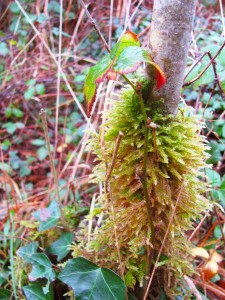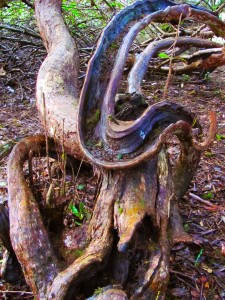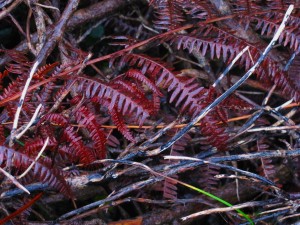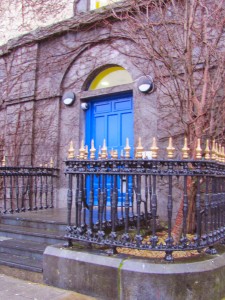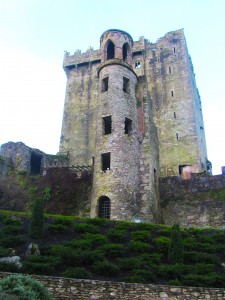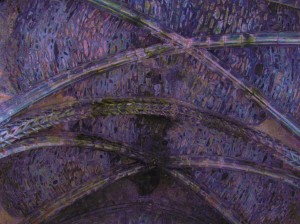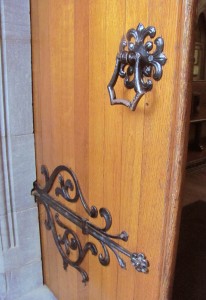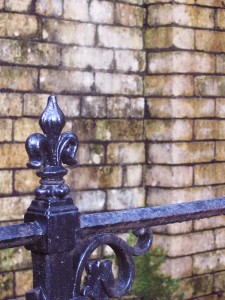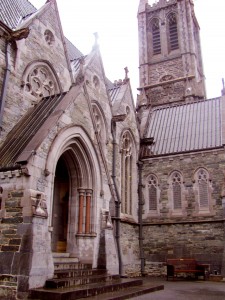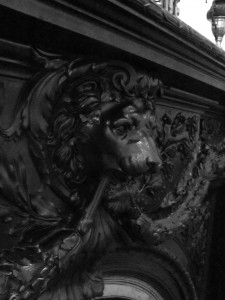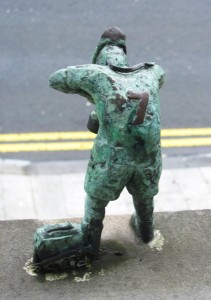A silence choked the air as the man strode across the cold stone floor and tucked himself away on the creaky oak bench. The white lapels of his crinkled shirt overpowered his brown blazer. The singer rested a guitar on his tan cords and held the neck of the instrument at his shoulders. He gave a rogue, hearty laugh as he chuckled with the guitar player and accordion player who opened the set. I leaned away from the sticky doorframe to look around the pub while he tuned his guitar. Despite its small size, the pub created a small arena of sound. In rare moments, when music wasn’t played, laughter and the clink of glasses filled the air. It lit up the dim atmosphere of the pub.
Helming the bar were a few generations of bar dwellers. Two bartenders service the pub. They looked as if they sat on two extremes of a century. One hung in the back like a gargoyle, observing with a stone face and hard eyes those who dared to ask for a pint. The other drowned in his pub shirt and served drafts with a dimple and a yes ma’am. Nearest to the performance booth sat two Irishmen beneath a clock that had no numbers, only letters selling G-U-I-N-N-E-S-S-T-I-M-E. They smashed their rum and cokes together in a toast. An American interrupted them, boasting about his life in New York as the foam of his Guinness stuck to the coarse hairs of his beard.
The smell of cigarette smoke wafted through the room as the door burst open again. A crowd of girls sauntered in and fell into a booth deeper in the bar. They wore identical fur jackets, denim shorts, platform stilettos, and painted brows that unnaturally dominated the small, pointed features of their foxlike faces.
A man with thinning grey hair and deeply grooved laugh lines sat in the front row waiting for his wife. He spoke about his son who was studying music in America and hehasanamericangirlfriendwhoplaysthefluteandwouldyoulikethiswebsiteaddresstohearhis music?Hewroteithimself. A damp chill entered the pub as the door flung open. A man ran in with a rain-soaked shirt clinging to the back of his neck. A blonde woman near the door shivered and gripped her wool sweater closer around her. The chill had penetrated through the adjacent room where we stood. I held my mug of hot whiskey up to my face and kept it there until the whiskey seared the back of my eyes. It spiked the back of my throat as the taste of lemon graced my lips.
The singer had settled in and was beginning his set. Only halfway through the first verse, he had changed the entire atmosphere of the pub. His brows furrowed together as he reminisced about a childhood filled with laughter on playgrounds. His dark eyes brimmed with emotion as he thought back to the work his parents had in the factory and the time they spent on the dole. His voice resonated with sorrow and longing, but despite the constant desperation of growing up in Ireland, he sings about the persistence of pride for his country.
And when times got tough there was just about enough
But they saw it through without complaining
For deep inside was a burning pride
In the town I loved so well.
Throughout the beginning of the song, the bar remained silent, but attentive, lingering on every word he sang. Trancelike. There was music there in the Derry air/Like a language that we all could understand. The tremble of his rolling voice intensified.
And the damned barbed wire gets higher and higher
With their tanks and their guns, oh my god what have they done
To the town I loved so well.
It was then that his voice broke. He wavered for a second before picking up the tune again, and it was then that he realized he was no longer alone.
The entire crowd had joined in for the last two verses. The Guinness Time men, the guitar player, the accordion player, the crowd of girls, the man who now sang with his wife. The guitar player and the accordion player, the French woman, and even the previously silent bartender sang softly out of the corner of his mouth. Only our group and the American remained silent. They sang the last words.
Now the music’s gone but they carry on
For their spirit’s been bruised never broken
They will not forget but their hearts are set
On tomorrow and peace once again.
For what’s done is done and what’s won is won
And what’s lost is lost and gone forever
I can only pray for a bright brand-new day
In the town I loved so well.
All this time in Ireland has been spent driving through the curves of the valley and the achingly lush and deep canvases of the mountains. Castles, tombs, and stonewalls dot the hillsides and represent a small part of the legacy of this land. The castles have decayed and rotted away. The dust floats away as the rocks crumble in to the richness of the land. I realized in this moment that the vibrant and the grey, the living and the dead, the exuberant and the turmoil all coincide and live together in this country.
I turned to a man seated hazardously on a stool inches behind me. His hair was plastered to his forehead, his face red and ruddy from the rum gripped in his hand, but he had been singing with such clarity and sincerity that he seemed as good of a person as anyone in the pub to ask about the song. I wanted to know simply what it said about what it means to be Irish.
He said, “The folk song, the song represents a transition from a time where we lived naively as children, to a time where the English reigned—oh my god what have they done! It’s a tradition of joy and love and loss and suffering. Ireland, we, we have always suffered, whether because of outside forces or whether because of each other. Never have we stopped fighting. Never have we given up. The song is about intense suffering, but it is about an even stronger, more powerful, hope.”
This man, in all his whiskey laden stupor, articulated the pain and anguish of a country of people and encapsulated the courage of hope to forage toward a greater future, a future more illustrative of a true Irish spirit.
Strong as his whiskey breath, misty as his eyes, unsteady as his balance, he made a compelling argument for an Irish future. I looked beyond him where the two bartenders, who had listened in on our conversation, were nodding vigorously in agreement at me. The pub warmly embraced every man and woman that walked in. I felt a strange sense arriving in this country, and it wasn’t until now that I realized it was a sense of belonging and homecoming. The conflictions of loss and depression and of comfort and determined hope and anticipation made me feel as if the Irish spirit lives within me.
As he explained, he nearly tore the belt loop off his trousers while searching for his bottle opener. Having found the bottle opener, he finally tore off the loop in a hunt for his lighter. He lurched towards the doorframe where he hung about until the smell of his cigarette lingered successfully in all corners of the bar before he disappeared for the night.
***
The accordion player performed a solo. In his previous performance, he held a charismatically kind and lopsided grin. His round cheeks and kind eyes gave the impression that he could not have been older than us. The accordion player rested with his eyes cast down for the entirety of the ballad. He shifted uncomfortably in his seat. As he sang, he bent his head over the accordion about which his arms were wrapped around. His worn and calloused fingers were intertwined and hovering in his lap, moving only subtly as if he was weaving a tight and nervous knot around his hands. He rocked back and forth on the edge of the bench, singing to himself.
Singing in a native Irish, his words came with no translation, no explanation. He sang softly, but confidently, never hesitating, never wavering. The man who now waited with his wife whispered to me, “I have a feeling no one could tell you what he’s singing. I would also bet you that they could tell you what he’s saying.”
As the pub broke out into applause, his eyes fluttered open, and he stirred out of his reverie. After he finished, his words lingered, hanging dense and heavy in the air, achingly beautiful and miserable. I could imagine the lyricist writing those words, sitting in a dark, damp room overlooking the fog dancing across the mountains before him. I imagine him pining for a love who’s left him. I imagine him despairing over how to feed his children. I imagine him mourning over the death of his father. I imagine myself in him, living in the embraces of his arms, swimming in the depths of his words.
Both singers set the history of joy and pain in Ireland to lyrical poetry as troubadours of the heroic and rebellious Irish nature that dominates the country and culture. The four of us looked to each other. Us Americans lost in Ireland. We looked to each other for answers, for guidance, for what to say next, for how to feel, but we were still spinning in our own reveries.
As the night’s performances wound down, I realized how much the performances had struck me. What stood out to me was not arrogant individuality, selfishness, volatile behavior that is unfairly attributed to Irishmen. There was no drowning one’s sorrows at the bottom of a bottle of rum nor drinking into oblivion. Also absent were angry red faces brawling in the pub. Emotions and embraces flooded the pub as the men sang, but drained away as reality set back in. What existed in this world of difference was a universalizing comfort and expectation. Hope simmered up and over the brim. The guitar, the accordion, the rogue voice, the heartbreakingly achy and sorrow-filled voice saved and preserved the Irish spirit in a time when the country feels worlds away from others. The words aroused and lifted the pilgrim soul in me.
As the singer had already left, the guitar player and the accordion player packed up their instruments. We paid our tabs. Yes ma’m. Bye ma’m. The stilettos clacked away on the cobblestone. Men left for smoke breaks letting in a crowd of smoke that had been waiting patiently in the doorway. The man drove his wife home. We too emerged into the darkness of the night, into the crisp frigidness of the air outside refreshing our minds and invigorating our spirits. We left with words still buried beneath our coats.
